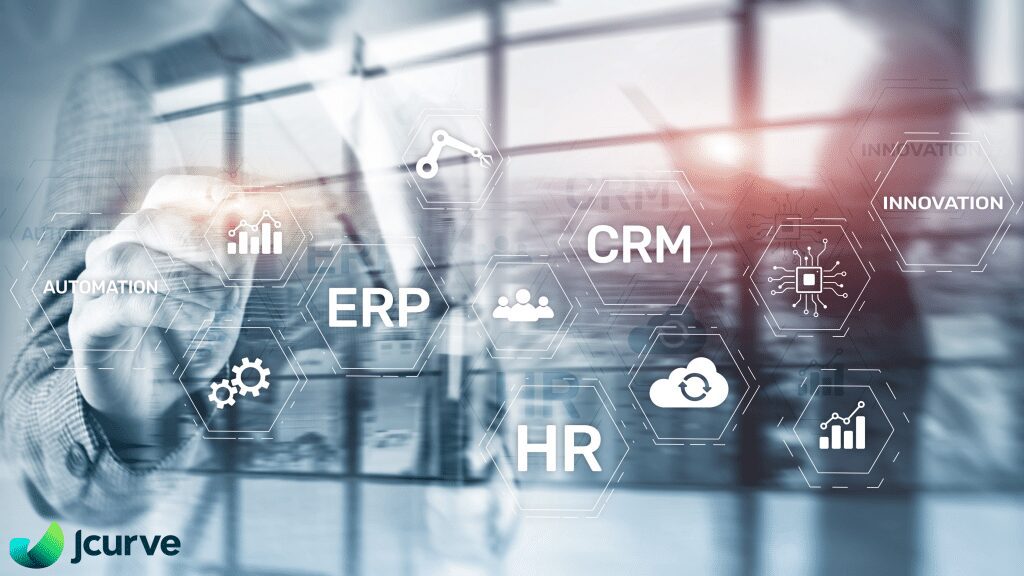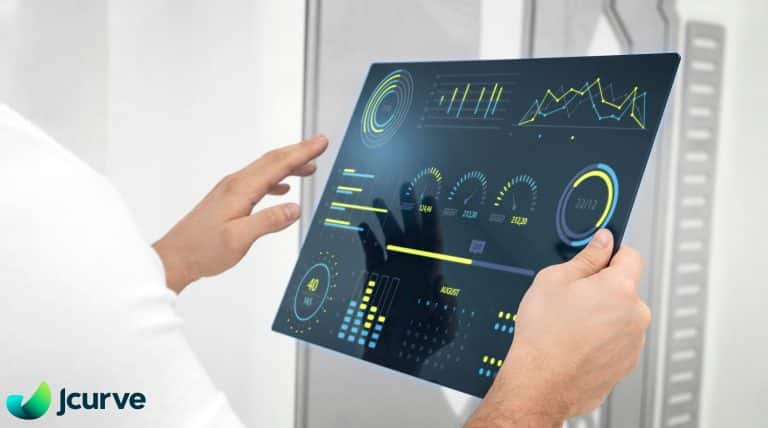Something which becomes quickly apparent when researching business software options, or even just searching for the term “what is an ERP system?”, is the huge amount of information available. You may have even worked with an ERP system before, without fully realising all the benefits it can deliver to your business.
The term ERP gets thrown around a lot, and not always in exactly the right context. Some businesses tend to refer to individual back-end systems as their “ERP”, but that’s not quite right. Originally coined by Gartner back in 1990, the ERP definition is an integrated suite of business applications which provide full end-to-end processes across all areas of the business, while sharing data and processes to help tie everything together. This, in turn, allows for system automation; the ability to speed processes up and minimise human interaction processing times. This all helps increase profitability and reduce costs.
Web based ERP, known as Cloud ERP or also as SaaS ERP, takes all the benefits of ERP and delivers them without the need for dedicated IT infrastructure and resources, as on-premise ERP systems tend to require. This keeps down IT costs as you’re not paying for high-end computer equipment, ongoing system maintenance costs or an IT professional to manage everything for you. It also ensures your valuable data isn’t just sitting on a physical server in a back room of your office – it’s safe in the cloud and available at any time, from almost any device.
Cloud computing benefits also extend to real-time, cross-department visibility on all your important business data, seamless, regular system upgrades, fast deployment and the ability to quickly scale as your business grows.
What’s the Difference Between an Accounting System and an ERP System?
That’s an easy one. An accounting system focuses strictly on the financial aspects of your operations including accounts receivable, accounts payable, trial balances and sometimes even includes payroll. An ERP system, on the other hand, contains all the features of an accounting system plus functionality covering order and inventory management software, CRM, sales, marketing, eCommerce, business intelligence and more. In short, it lets you manage your entire business from end-to-end.
At the heart of an ERP system is a single, unified database that supports the various business functions. It brings together your inventory management, distribution, finance, sales, customer, vendor and employee data and gives you access to information across the business. Put simply, it means that Aaron from Accounting, Sarah from Sales and Warren from Warehousing can rely on using the same up to date information, but put into context for their areas of the business.
For more in-depth information on ERP, see our article, What is ERP Software? or get a quick, 2-minute video overview:
See our video explainer, What is ERP?, for a concise 2-minute overview.
What About the Accessibility of ERP?
 ERP systems were once the domain of enterprises or large organisations, due to their complexity and cost. They were traditionally run from on-premise servers, which also needed dedicated IT staff to monitor and maintain them. But the times have changed, due to both the explosion of the internet and the availability and accessibility of technology in our everyday lives. This has created a platform for cloud technology to deliver ERP to a rapidly increasing number of growing businesses who rely on technology to manage more than just financials and inventory. It also positions businesses of all sizes to seriously compete with larger enterprises – whether it be locally or on the global stage.
ERP systems were once the domain of enterprises or large organisations, due to their complexity and cost. They were traditionally run from on-premise servers, which also needed dedicated IT staff to monitor and maintain them. But the times have changed, due to both the explosion of the internet and the availability and accessibility of technology in our everyday lives. This has created a platform for cloud technology to deliver ERP to a rapidly increasing number of growing businesses who rely on technology to manage more than just financials and inventory. It also positions businesses of all sizes to seriously compete with larger enterprises – whether it be locally or on the global stage.
Cloud computing has also helped to fuel the uptake of ERP by making it more affordable, flexible and easier to implement and maintain. In fact, according to the Australian Bureau of Statistics, almost 70 percent of Australian businesses are embracing cloud services.
How Can Cloud ERP Software Help Your Business?
The premise of ERP software is that it will make your company more efficient and employees more productive, simply by breaking down the barriers between departments or business functions and providing the right information and access to it.
A cloud ERP system can also take this further by empowering employees with real-time data and analytics, available at any time, from almost any device. This means that Sarah from Sales can be out at a customer site and provide up-to-the-minute stock level information to her customer; at the same moment that Warren from Warehousing is receiving in or sending out more of that same stock. It also means that Aaron from Accounting doesn’t need to constantly chase Sarah for bill payment from her customers, she’ll have that information on-hand with her when speaking to or visiting customers so she can proactively manage the status of her accounts. She can even re-send invoices directly from the system, without having to wait for accounts to print her a copy.
This is what ERP was born to do; save you time, double-handling, reduce complexity and overall costs, while also setting you up to sell more product, faster.
What Else Can a Cloud ERP System Do?
 Typically, users of ERP systems:
Typically, users of ERP systems:
- Cut overall inventory costs and streamline order management
- Drive sales numbers and grow eCommerce orders
- Increase customer satisfaction and generate more repeat business
- Improve financial performance and leverage business intelligence
Cloud ERP software provides comprehensive reporting, based on real-time data. Instead of employees having to maintain separate databases and spreadsheets that have to be manually merged to generate reports, cloud ERP software allows staff to pull consolidated reports from one system that can be saved and reused as regularly as needed. Other popular web based ERP features include customisable dashboards that enable employees to access key metrics of the business’ performance specific to their role as soon as they log into the system.
A few of the main questions to be considered when thinking about an ERP are:
Is the ERP you’re looking at going to:
- Streamline and automate core business operations such as lead-to-cash, order-to-fulfilment and procure to pay?
- Provide a 360-degree view of data in real-time so you can address concerns quickly and make the most of market opportunities?
- Improve financial performance with immediate visibility into accounting, payroll, inventory, sales and more?
- Enhance customer service by giving you one source for billing, order status information and relationship management?
Define What You Need and the Results You Expect with ERP
If you’re starting to ask “So what can I expect from an ERP?”, it’s a good idea to also start defining which business aspects that are the most important to you right now. Is Warren from the warehouse telling you he’s writing off quite a bit of stock each month because he has no trend data which shows the ebbs and flows of stock demand? Or is it Sarah from Sales who’s having trouble hitting her sales targets, because she doesn’t have the real-time product and inventory data she needs when she’s in front of a customer with only her iPad?
This will give you a great basis to have the right conversations with an ERP vendors or ERP cloud vendors about what kind of results you can expect to see using their ERP solution.
As an example, SL Associated conducted a study of wholesale distribution companies who implemented the global #1 cloud ERP, NetSuite. The improvements in key performance metrics they found were:
Increases:
- Gross Margin Performance: + 1% to 5%
- Revenue Performance: + 2% to 10%
- Actionable Business Insights: + 50% to 80%
Decreases:
- Inventory Costs: – 20% to 30%
- Obsolete Inventory Carrying Costs: – 20% to 30%
- Customer Backorders: – 60% to 80%
- IT Resource Costs: – 50% to 75%
Are You Ready for an ERP System?
Implementing a new system can be a little like parenthood – you never really feel ready for it. But if it’s taking longer and longer for you to reconcile your accounts at the end of the month, if you’re having difficulties keeping up with orders or if you don’t know how much inventory you have, then the cost of not acting might be the one reason you need to dive in.
There are some warning signs to look out for, which are all indicators of what could be costing your business in terms of time, resources and stock and also potentially stunting sales growth, such as:
- Employees have a mountain of spreadsheets and sometimes end up with conflicting data in their reporting
- There are a few different software systems in place which don’t talk to each other and share data
- You can’t access KPIs or business intelligence information about the state of your business quickly or easily
- Accounting tends to take a long time and there are many manual processes involved
- Sales and inventory are out of sync and your customers aren’t getting the right information 100% of the time
- The warehouse is writing off a lot of stock every month
- You don’t have a clear picture of your IT management and it’s become time-consuming and costly whenever there’s an issue
- Your sales aren’t growing as fast as you’d like and you’re not certain why
- Your operations are less profitable than they used to be
- Your employees are frustrated with having to use multiple systems and spend a lot of time waiting on business data from each other
If you’re experiencing some of these common symptoms, it may be a sign that your business has outgrown your current systems. Why not take a look at what a cloud ERP system can do for you? There are a heap of benefits waiting for you, that will empower Sarah from Sales, Warren from Warehousing and Aaron from Accounts to work more efficiently and effectively together.
If you’d like more information about the costs of cloud ERP compared with on-premise solutions, have read of our whitepaper, The Real Costs of ERP – On-Premise and Cloud Compared, or get in touch to start a conversation.










